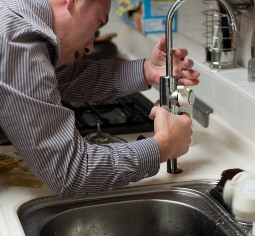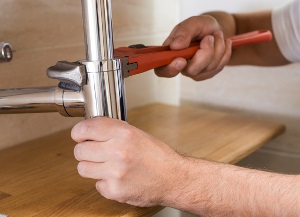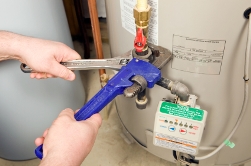Choosing a Plumbing Technology Program
 Becoming a plumber generally entails entering an apprenticeship program after receiving training in a plumbing trade school. You can choose to attend a technical school or enroll in a community college to earn either a certificate or an Associate Degree. Degree programs are broader in scope and generally take 2 years to complete, whereas a certificate program will concentrate on the fundamentals and can be completed in as little as 1 year. Some colleges do offer Bachelor Degree programs in plumbing technology which are 4 year programs. Obviously cost will be a prime consideration in determining which program you pursue and which school you decide to enroll in. Tuition can vary greatly among the trade schools and colleges, and at the higher end can be quite expensive. But keep in mind that student loans and financial aid may be available, and in-state residents often pay lower tuition, particularly for programs at community colleges. So now that we have touched on some of the initial factors that you will need to consider before enrolling in a plumbing vocational school, what else should you look at before making your final choice? First, let’s discuss what is involved in becoming a plumber, and then we will review some of the check-list items that you should investigate when comparing the available schools and programs.
Becoming a plumber generally entails entering an apprenticeship program after receiving training in a plumbing trade school. You can choose to attend a technical school or enroll in a community college to earn either a certificate or an Associate Degree. Degree programs are broader in scope and generally take 2 years to complete, whereas a certificate program will concentrate on the fundamentals and can be completed in as little as 1 year. Some colleges do offer Bachelor Degree programs in plumbing technology which are 4 year programs. Obviously cost will be a prime consideration in determining which program you pursue and which school you decide to enroll in. Tuition can vary greatly among the trade schools and colleges, and at the higher end can be quite expensive. But keep in mind that student loans and financial aid may be available, and in-state residents often pay lower tuition, particularly for programs at community colleges. So now that we have touched on some of the initial factors that you will need to consider before enrolling in a plumbing vocational school, what else should you look at before making your final choice? First, let’s discuss what is involved in becoming a plumber, and then we will review some of the check-list items that you should investigate when comparing the available schools and programs.
[campusexplorer header_text=”YES, I WANT FREE INFO ON PLUMBING TRADE SCHOOLS NOW!” aos=”53237562″ concentration=”B25936FE” tracking=”PLUMER-MPC”]
What is a Plumber?
 As you probably know, plumbers play an important role in the functioning of residential and commercial dwellings. No doubt at some time you or a family member has called upon the services of a plumbing contractor to fix a leaky pipe or perhaps install a new water heater. In general, a plumber is a skilled tradesman who installs, repairs, or replaces plumbing systems. This includes pipes and fixtures, water based heating and cooling systems, as well as sprinklers and sewage removal systems. There are three phases that a professional plumber can go through during the course of his or her career.
As you probably know, plumbers play an important role in the functioning of residential and commercial dwellings. No doubt at some time you or a family member has called upon the services of a plumbing contractor to fix a leaky pipe or perhaps install a new water heater. In general, a plumber is a skilled tradesman who installs, repairs, or replaces plumbing systems. This includes pipes and fixtures, water based heating and cooling systems, as well as sprinklers and sewage removal systems. There are three phases that a professional plumber can go through during the course of his or her career.
- Apprentice. Most new plumbers start out their careers as an Apprentice. This phase can be conducted in conjunction with a formal plumbing training course. In this unlicensed (check your state) but paid position the Apprentice will typically work under the tutelage of a licensed plumber during the day and attend plumbing classes in the evening. Once the apprenticeship and the school program have been completed, the next phase can begin.
- Journeyman. With the completion of the Apprentice program and the required trade school or community college training, the Journeyman licensing can be applied for. Generally licensing is conducted by the state, but in some instances it is handled at the county or local level. Once the licensing exam is passed and all other requirements are satisfied, a Journeyman Plumber license will be issued. Although more experienced, knowledgeable and highly paid than an Apprentice, a Journeyman Plumber must still in most cases work under the supervision of a Master Plumber.
- Master Plumber. Once the Journeyman Plumber has the work experience required in his or her state, as well as completed any additional education requirements, he or she can apply to become a Master Plumber. After taking and passing the exam, a license will be issued. Master Plumbers enjoy the benefits of working without supervision and at the highest end of the pay scale. They may also start their own business and employ Apprentice and Journeyman plumbers.
Something to keep in mind is that plumbing is a technical field and will take years of training and experience to truly master. That is why it is extremely important to start your career with the best opportunity for success by vetting and enrolling in a plumbing technology school that will give you the proper training.
Narrowing Down your Plumbing Trade School Options
 Once you have decided to earn either a certificate or a degree, you can start narrowing down your list of school options. There are many plumbing vocational schools in your area and throughout the United States to choose from, so it is important to have a checklist to use when making your comparisons. As has already been discussed, the cost of tuition and additional expenses is one of the most important qualifiers and will limit your possibilities based on your budget. Following are some additional important factors that you need to research before making your final selection.
Once you have decided to earn either a certificate or a degree, you can start narrowing down your list of school options. There are many plumbing vocational schools in your area and throughout the United States to choose from, so it is important to have a checklist to use when making your comparisons. As has already been discussed, the cost of tuition and additional expenses is one of the most important qualifiers and will limit your possibilities based on your budget. Following are some additional important factors that you need to research before making your final selection.
Are the Plumbing Vocational School and Program Accredited? Many plumbing trade schools and programs have earned either a regional or a national accreditation, or both. They can earn Institutional Accreditation, which involves the school’s programs as a whole, or Programmatic Accreditation, which relates to a specific program, such as plumbing technology. Make sure that the degree program as well as the school is accredited by a U.S. Department of Education recognized accrediting organization. In addition to helping ensure that you receive a quality education, it may assist in securing financial aid or student loans, which are often not available for non-accredited schools. Also, many states require that the plumbing training program be accredited in order to qualify for licensing. Finally, many potential employers only recognize certain accreditations when considering future hires, so find out which ones are held in esteem in your area.
What are the Completion and Job Placement Rates? Find out from the plumbing schools you are considering what their completion rates are. The completion rate is the percentage of students who enroll in and complete the program. Also, find out how long on average it takes students to complete the program. A low completion rate may indicate that students were dissatisfied with the program and dropped out. It may also mean that the instructors were not qualified or proficient at training the students. It is also important that the school has a high job placement rate. Older schools may have a broader list of alumni, which can mean more contacts for the school to use for their apprenticeship and job placement programs. A high job placement rate will not only confirm that the school has a good reputation within the industry, but also that it has the network of contacts to help students obtain apprenticeships or employment upon graduation.
Does the Trade School provide Apprenticeship Programs? As we previously discussed, most plumbing vocational programs are taught in conjunction with an apprenticeship. Many colleges and trade schools will help place you in an apprenticeship program with plumbing companies or labor unions. Find out if the schools have working relationships with local master plumbers or plumbing contractors. An apprenticeship will not only be a rewarding experience as far as technical hands-on training, but it will also provide employment and help establish relationships in the local plumbing community.
Tour the Campus Facilities. Unless you are able to relocate, the school needs to be within commuting distance of your home. Remember that if you decide to attend an out-of-state school, in addition to relocation costs it may require higher tuition fees than for in-state students. Also be sure to check out the campus facilities in person before paying your first tuition payment. Make sure that the facilities and the equipment that you will be trained on are state-of-the-art and what you will be using in the field. If you are already in an apprenticeship, check with the Master Plumber you are working with regarding what you should be looking for. If not, ask a local plumbing contractor if they can give you some tips.
Are the Classes Large or Small? It is important that you receive as much one-on-one instruction as possible, which can be difficult in larger classes. Ask if you can sit in on some of the classes so that you can see how large they are and experience the interaction between instructors and students. Speak with some of the students and get their input regarding class sizes and instruction. Finally, speak with some of the teachers and find out what their level of experience is and what degrees or certifications they hold.
Does the Class Schedule fit Your Schedule? The final checkpoint is to confirm that the class schedules for the schools you are evaluating are flexible enough to meet your needs. If you can only attend classes at night or on weekends near your home due to your apprenticeship, make sure that the schools you are considering offer classes during those days and times. If you can only attend part-time, again make sure that the school you choose can accommodate you. Also, find out what the policy is to make up classes should you miss any due to work, illness or family emergencies.
Learn More About Plumbing Trade Schools
Pick the Right Plumbing Vocational School
Choosing the right plumber training program is an important first step toward a rewarding career that provides help to people in all walks of life. As we have covered in this article, you should select a school and a certificate or degree program that are both accredited and have excellent reputations within the plumbing community. And if you follow the above checklist for evaluating the schools you are considering, you will be able to narrow down your options so that you can make your final choice. With the right training and apprenticeship, as well as discipline and dedication, you can eventually become a Master Plumber.
